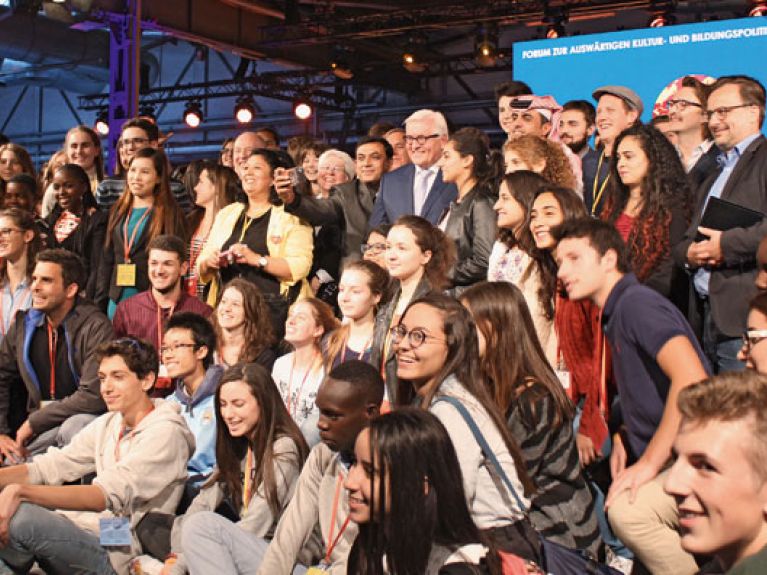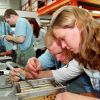The best ambassadors for a peaceful world
Over 300 students, teachers, school principals and representatives of education from 30 countries discovered what cultural relations and education policy achieves during the “Inspiring People” forum in Berlin.

She talks about her flight to Berlin sitting one row behind TV presenter Anne Will, the selfie with Federal Foreign Minister Frank-Walter Steinmeier and the many workshops and discussions with students from all over the world. When 18-year-old Malak El-Shorbagy, a student of Deutsche Evangelische Oberschule in Cairo, Egypt, describes her experiences in Berlin, you completely forget that German is not the native language of this petite young woman with dark curly hair and alert eyes. Malak does not have German roots and has never attended school in Germany, and yet she speaks German without the slightest trace of an accent. “I’ve been learning German since kindergarten. My mother wanted me to do it,” explains the 12th grade student at the “Inspiring People” forum. “I dream of studying political science, preferably in Egypt and Germany.”
Malak El-Shorbagy is one of over 200 school students from 30 countries that the Federal Foreign Office invited to Berlin for a three-day cultural relations and education policy summit in April 2016. The Federal Foreign Office used practical examples to show students, teachers, school principals, scholarship holders and representatives of education authorities why cultural relations and education policy is the important third pillar of German foreign policy alongside political and economic relations. “It is about nurturing humanity through culture and education,” said Federal Foreign Minister Steinmeier in his speech on the final day of the forum. “It is about a cultural relations policy that creates the conditions for this. We need a cultural relations policy that is fully convinced about, and that strengthens, culture’s power in society.”
The guests exchanged views on sustainability, education partnerships and the German language in discussions, workshops and specialist forums. They also experienced “cultural and foreign policy live”, and a Market of Possibilities enabled them to find out about the work of Federal Foreign Office intermediary organisations, such as the Goethe-Institut, the German Academic Exchange Service (DAAD) and the Institute for Foreign Cultural Relations (ifa). Visitors also experienced cultural practice during the Long Night of Ideas: museums and cultural hotspots, including the Maxim Gorki Theater, the German Museum of Technology and the Haus der Kulturen der Welt, opened their doors for talks, debates and tours that continued into the small hours. DJ workshops and performances as well as lectures on games and inclusion demonstrate the breadth of the cultural concept.
As a model for success, Schools – Partners for the Future (PASCH) was a major focus of the event. Founded by the Federal Foreign Office in 2008, this initiative has grown into a network of over 1,800 schools around the world – from Bodø in Norway to Punta Arenas in southern Chile and from Anchorage in Alaska to Yokohama in Japan. There are also 350 German partner school. At its launch, the PASCH initiative also focused especially on regions where German international education policy had not been strongly represented: Asia, the Near and Middle East and Sub-Saharan Africa. “Language means immersing yourself in another culture,” said Maria Böhmer, Minister of State at the Federal Foreign Office, who is responsible for cultural relations and education policy. “You are the best ambassadors I can imagine.” As Special Representative for UNESCO World Heritage, Maria Böhmer attaches great importance to the preservation and reconstruction of heritage sites like those in Syria: “We are living in a globalised era,” she said. “We must give young people the chance to gain a foothold in this world and make them experts to one day rebuild sites like Palmyra.” ▪

